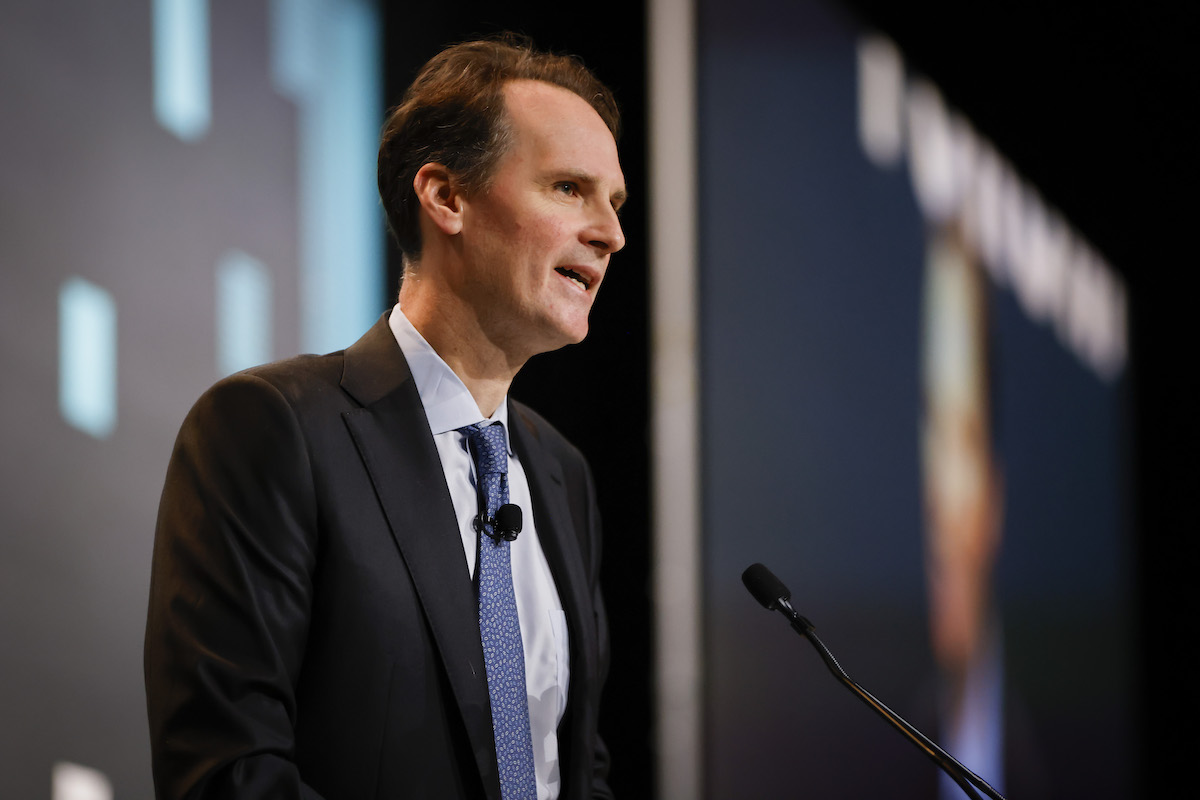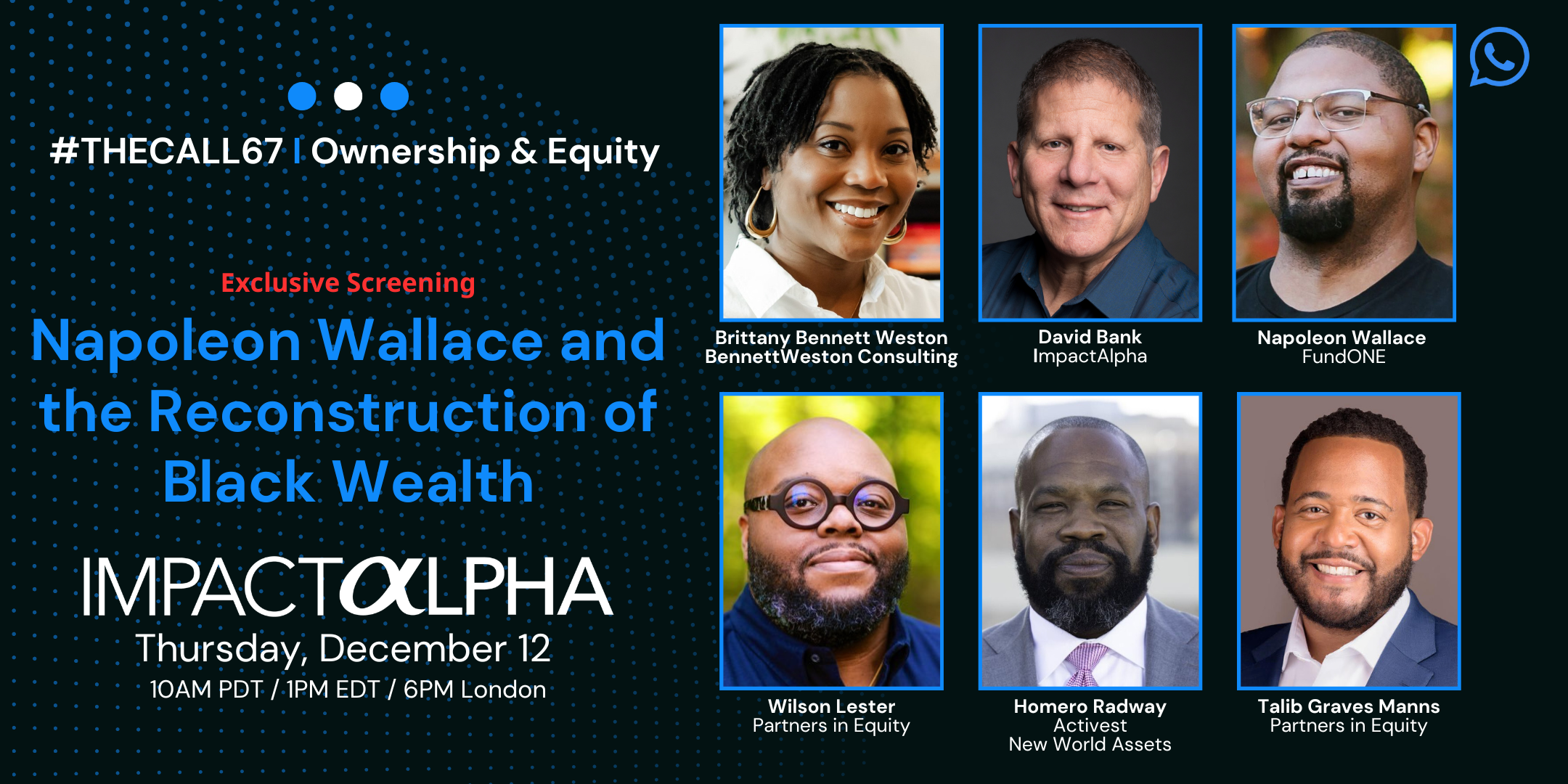The best defense is a good offense, says John Palfrey, president of the $8.2 billion MacArthur Foundation. The agenda to create a more inclusive form of capitalism “is going to be successful and it’s going to bring a lot of people along,” Palfrey told ImpactAlpha in a revealing Q&A.
Palfrey’s response to the coordinated attacks on DEI (diversity, equity and inclusion) and ESG (environmental, social and governance): Continue making impact investments that deliver on the promise a multiracial democracy in which everyone thrives.
Palfrey, who took the helm of MacArthur Foundation in 2019, last year succeeded Ford Foundation’s Darren Walker as chair of the advisory board of the US Impact Investing Alliance. “We are long and strong on impact investing and will continue to be,” Palfrey said. “The net effect of that is going to be a much healthier US economy and global economy.”
Multiracial prosperity
Over four decades, MacArthur Foundation has committed more than $750 million to roughly 200 mission-driven funds and enterprises, including recent investments in Invest Appalachia and Candide Group’s Afterglow Climate Justice Fund.
“I see this as a set of investments that bring about the kind of society that we should all want to live in, which is one that allows for everybody to thrive,” says Palfrey, who expects MacArthur in coming years to commit more capital and more resources to impact investing, with deeper integration of grant making, impact investing and the endowment. “That’s exactly where we need to be,” he says.
Palfrey joins a growing chorus of philanthropic and business leaders offering a counter-narrative to conservative criticisms of efforts to promote diversity and inclusion. See, for example, McKnight Foundation’s Tonya Allen, Operation Hope’s John Hope Bryant, Robert Raben of the Diverse Asset Managers Initiative and Sandhya Nakhasi of Common Future.
Key messages: Increased participation in the economy drives much-needed economic growth, and investing in underserved populations is an opportunity for risk-adjusted returns. The best posture, Palfrey says, “is one of offense, not defense, and continuing to just do the work with conviction.”
Catalytic capital
The MacArthur Foundation has been a champion and pioneer in the deployment of catalytic capital to drive deeper impact and crowd in commercial capital, including as the anchor of the Catalytic Capital Consortium, which supports ImpactAlpha’s coverage.
A $25 million MacArthur guarantee for the SDG Loan Fund late last year helped unlock more than $1 billion from European banks and insurance companies for small and growing businesses, resilient agriculture and climate solutions in emerging markets (for context, see “Allianz’s SDG Loan Fund leverages a $25 million guarantee to catalyze $1.1 billion”).
“We should be doing that all day long,” says Palfrey. Going forward, he expects such partnerships “to develop new institutions that are going to make things possible we can’t imagine today.”
ImpactAlpha: What’s exciting you most about MacArthur Foundation’s impact investing strategy at the moment?
John Palfrey: Well, first of all, I’d say I believe that what we do in impact investing is one of the most important things we do period at MacArthur Foundation.
I am enormously proud of the history, most of which I can’t take credit for, over 40 years. The program has made more than $750 million in impact investments across 200 organizations and we are extremely excited about the returns – both social returns and financial returns through that portfolio. We are long and strong on impact investing and will continue to be. As we look ahead, it really is learning from those 40 years and finding ways to deepen the quality of the work and broaden the set of investees that we work with.
We’ll get back around to diversity, equity and inclusion later in the conversation, but that’s certainly a big part of that learning and part of that exploration.
I would also say deep connection to other parts of our programs. I’m going to stick with climate as one example. Our largest grant making program is climate. One of the things I’m most excited about, this may seem boring, but the idea that our climate program team meets with our climate impact investing team, which meets with our endowment team on a monthly basis and they compare notes. The alignment there across those three functions that are central to what we do, or really, descriptive of what we do, between our endowment, our impact investing and our grant making, that’s exactly where we need to be and need to go across our programs.
ImpactAlpha: In terms of the $750 million figure that you mentioned, is that inclusive of mission-related investments from the endowment? How are you thinking about the foundation’s endowment as a tool for mission?
Palfrey: I think about it as a set of assets that we deploy across the board to achieve our mission. Sometimes it’s a grant. Sometimes it’s a PRI. Sometimes it’s an MRI. I see these things as a set of tools that we have in our toolbox and we deploy them as well as we can. What I just described as the $750 million that we have done, yes, that is inclusive of PRIs and MRIs that have been put forward by our impact investing team.
The way we think about it, again, we’re all part of the same organization. We’re trying to accomplish the same goals. A grant is a grant, we know what that looks like and that’s most of what we do. With PRIs and MRIs, the point is that they are social returns first and financial return second. We are doing them in the spirit of trying to accomplish something to improve the environment or to achieve a racial equity goal.
With respect to our endowment, they are financial-returns first and we are seeking to align those more increasingly with our overall mission. It’s a little bit what emphasis you are bringing to the engagement, but I see them as all connected.
ImpactAlpha: How have impact investing tools – debt, equity, etc. – changed philanthropy at MacArthur, but also among your peer foundations?
Palfrey: I see impact investing as the growth edge for philanthropy. In many respects, I think it’s the place where the most sophistication, as well as innovation, can come. We need to, as a field, explore it more, take what may look like risk in this area, but by doing so, in ways that are innovative and see if we can move bigger and bigger mountains. An example I would think about, the SDG Loan Fund that we closed in early December, I know you guys covered. A guarantee that was relatively modest for us to make that could unlock a billion dollars in private capital, we should be doing that all day long, right? Finding interesting ways to put money in the hands of marginalized communities around the world.
There’s so much more that we can do. You and I will talk in five or 10 years and we’ll talk about some deals and arrangements and impact investing approaches that we couldn’t possibly imagine today.
ImpactAlpha: You mentioned the SDG Loan Fund and guarantees. MacArthur has been out front in the use of such catalytic capital as a way to crowd in private capital to high-impact funds and other projects. What’s your main takeaway from that work and do you think we’ll be seeing more billion dollar transactions?
Catalytic capital holds enormous potential for collaboration among investors across the spectrum of capital, both in blended finance transactions like the SDG Loan Fund, but also in taking disproportionate risk to support promising managers, products, and sectors like ALIVE Ventures, Impact America Fund, and Azolla Ventures.
The SDG Loan Fund brings together the philanthropic, development finance, and private sectors, with each partner leaning into their strengths to create deeper impact together than could be achieved separately. It’s this willingness to collaborate and take on risk, while also staying true to your strengths and expertise, that has the power to unlock more capital and greater impact. I think we will see more funds of this type, and I hope the SDG Loan Fund can be a model for others.
While I’m hopeful we will see more large-scale blended finance investments like the SDG Loan Fund, we also need investors willing to “seed” catalytic capital, which requires smaller investments and less immediate financial leverage. And we also need catalytic capital that “sustains” in order to support high-impact opportunities that require ongoing concessions.
All of these uses of catalytic capital—seeding, scaling, and sustaining—are important and can help drive progress towards a more equitable and sustainable world.
ImpactAlpha: That was my next question! If we do look out over 10 years, at MacArthur, how has impact investment evolved?
Palfrey: I would absolutely expect more money to be going into impact investing over that 10 year period of time. I would expect more alignment and connection again to the grant making programs and to the conventional endowment investing. I would think though, the innovations may be more of type and approach.
I think it is fair to credit a partnership between the nonprofit space and impact investors for the rise of CDFIs over the last several decades, as an example. I don’t know what the next version of that partnership, coming up with the next form of CDFIs, but I’m imagining that comes out of the creative process of impact investors partnering with one another and with those who are bringing about change on the ground, to develop new institutions that are going to make things possible we can’t imagine today.
That form of innovation is what I have my eye on. I don’t know what it’s going to be, but I’m excited about the possibilities.
ImpactAlpha: With your Alliance hat on, what do you see the industry needing to prioritize heading forward?
Palfrey: I’m honored to be Board Chair of the Alliance and it’s the only board that I’m chairing. I do it in part because it’s so central to our field. Also, because I get to learn a lot working with Fran Seegull and John Cochrane and their team. They’re brilliant, as you know. One of the key elements of that work is the policy work. Staying close to where the changes are in mostly federal US policy, but not exclusively. The work around the world with respect to standards for impact investing I think is extremely interesting.
The Alliance very thoughtfully draws more people into the field of impact investing and helps to educate all of us in a way that is powerful. Whether that is bringing in philanthropies, families that are getting more deeply involved in this work, or banks, or large donor-advised fund holders in the case of Fidelity Charitable on our impact investing board. It’s about having an Alliance that is really pushing for the agenda of impact investing for the good of all.
ImpactAlpha: I want to talk about the attacks on DEI. It seems there could be alternative narrative that isn’t punching through. Why do you believe in an inclusive economy and in the investments that you’re making?
Palfrey: MacArthur Foundation has long been focused on racial justice goals and racial equity goals, and we are absolutely just as committed today as we were in the past.
The Supreme Court ruling last year around affirmative action did not focus on our sector, and in my view, while it is a regrettable approach to education admissions, it doesn’t change what we do every day as the MacArthur Foundation or as impact investors.
This is part of that throughline of support for a multiracial democracy that we perceive to be a good society. My colleagues, who are leading other big foundations doing this work, and I believe we are all on the same mission and staying long and strong in that respect.
I see this as a set of investments that bring about the kind of society that we should all want to live in, which is one that allows for everybody to thrive and that the net effect of that is going to be a much healthier US economy and global economy.
I see the goals of racial equity, racial justice, impact investing as driving towards an inclusive form of capitalism that I think will be very positive for everyone.
ImpactAlpha: Who do you think is hitting the right notes on that narrative?
Palfrey: I hope MacArthur will continue to be a leader in this space, and we’re committed to that. But we certainly do so alongside and falling behind others who are our partners. People like Tonya Allen at McKnight Foundation, who I think is doing this work in incredibly creative and effective ways. Don Chen at Surdna Foundation. Darren Walker, certainly, at Ford Foundation. In the impact investing world there are a number of people who have found both effective and creative ways to do this work. We are shoulder to shoulder with them and learn from them all the time.
ImpactAlpha: What, if anything, has surprised you about reaction to the attacks on ESG and DEI?
Palfrey: I think we need to stay on our feet. We need to continue doing the work of making the case, doing the deals, creating the institutions, promoting good policies. I believe it’s going to work. I think one of the reasons to be in favor of this agenda toward a more inclusive form of capitalism is it’s going to be successful and it’s going to bring a lot of people along and it’s going to be something that leads more people to thrive. Our best posture is one of offense not defense and continuing to just do the work with conviction.
ImpactAlpha: How do you go on offense?
Palfrey. It is doing the work, ultimately. My strong preference is to be speaking through our actions and to make the best investments we can, the best partnerships we can and show the extraordinary results that it will create. And show that the other points of view are short sighted. That’s the game plan. We are also putting up funds along with others to ensure that the groundless lawsuits are not able to distract us from the work and our partners in the work. The most important thing we can do is not just stay the course but stay the course in a way that makes the case.
ImpactAlpha: Has there been a coordinated effort among foundations?
Palfrey: Absolutely. There is and will continue to be effective coordination among foundations who are committed to bringing about a multiracial economy that is, in fact, equitable and inclusive and diverse and we will continue to coordinate share notes, grow funds, and make this incredibly important case here in the United States and globally.
ImpactAlpha: Are there any other initiatives, innovations, policy efforts, that you’re excited about?
Palfrey: Watch this space. There are so many people doing interesting work that bring about a more inclusive and prosperous economy and thinking about capital in different ways and how we can resource a broader set of people – that’s the work.












